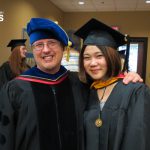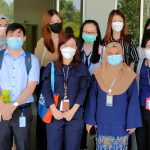Li Xin Pei, an international student from China, is currently pursuing a dentistry degree at IMU University in Kuala Lumpur, Malaysia. Her interest in dentistry was sparked after a bad dental experience when she first visited the dentist for tooth decay. The dentist treated her poorly, and the filling process was very uncomfortable. This made her think about how she would treat her patients if she became a dentist and whether she could do better, leading her to research dentistry online. Additionally, Xin Pei enjoys hands-on activities, which she feels makes her well-suited for studying dentistry.
What attracted Xin Pei to Malaysia and IMU for her dentistry studies? The cost-effectiveness of studying abroad was one of the factors she considered. As we all know, Malaysia is very close to China, making it very convenient for Chinese students, especially in the capital city of Kuala Lumpur, to travel back and forth. This was also a point that attracted Xin Pei to study in Malaysia. Additionally, Malaysia is known for its diverse cultural society, which allows her to experience new things and broaden her opportunities and horizons in various aspects.
Xin Pei learned about IMU from her mother’s friends, who are dentists working in Singapore and Penang, and they recommended IMU as a good option if she preferred to study in Kuala Lumpur. From a professional standpoint, the facilities at IMU were newer and more comprehensive. She also prefers to have opportunities where she can gain practical knowledge. She had learned that IMU has partnerships with many prestigious universities, and some of the faculty members are renowned and frequently invited to give lectures and workshops. Personally, the opportunity to meet students from various countries was also appealing to her.
Xin Pei tells us more in this interview.
What challenges did you face upon arriving in Malaysia?
To be honest, language was a big challenge when I first arrived in Malaysia, as I didn’t have much exposure to an English-speaking environment in China. I was a little afraid to communicate with people, especially in class. I wasn’t used to the all-English environment or the teachers’ accents, which slowed my learning progress at the time. Fortunately, my classmates helped me a lot.
Over time, I began to understand more, and I could feel myself making progress. Additionally, being able to speak another language fluently, besides my mother tongue, was really cool. The more I spoke, the more confident I became.
On the other hand, culture and food were not a challenge for me, as the culture here is very inclusive. The teachers and classmates are all very kind, and there is a wide variety of delicious food. For example, I like Nasi Lemak and Bak Kut Teh.
How have you found the programme so far?
Dentistry is a very challenging programme. Not only do you need to study the subject matter intensively, but you also have to learn how to communicate with patients and senior doctors. It takes time to practice and improve your hands-on skills. At the beginning of each subject, it took me a lot of time to study, and sometimes I didn’t understand it even after going over it several times. However, the more I study, the better it gets, especially with practice in the clinic.

Overall, it is quite tiring, but being able to provide valuable help to others makes the time spent feel meaningful. I think IMU’s dental programme has a great curriculum, with enough courses for laboratory practice and ample opportunities for clinical practice.
What are your most memorable moments?

I think the most memorable part is the time spent in the clinic. You encounter different patients and cases, which can be very demanding. It’s different from practicing in the laboratory — you need to consider more aspects and discuss the cases with supervisors while learning from them. My friends studying dentistry in China told me they mostly observe alongside their lecturers during classes, which means they don’t have the opportunity to practice hands-on themselves.
Since my classes started during the pandemic, I came to the university on my own. My tutor and lecturers who were on-site in the university were very helpful.
They guided me in familiarizing myself with the environment and asked if I needed anything. Everyone was very caring, and the atmosphere between the teachers and students was very harmonious.
What are your most challenging moments studying at IMU?
It is more challenging for me to communicate with different patients to confirm the treatment plan.
I may meet different supervisors in each session, and each has their own ideas and considerations. In these situations, I not only have to understand the reasoning behind each idea but also adjust the plan according to the patient’s condition. Therefore, the choice of treatment plan should first address the most clearly defined issue. Timely and effective communication with patients can prevent many problems.

Balancing my time is also a challenge. In the higher semesters, we have more clinical sessions, and during this period, I also have exams, deadlines, and group assignments. Managing all of these can be quite stressful.
What type of community work were you involved in?
Yes, we have a module called Community Oral Health, and I’ve had several community work experiences. The first community work I participated in was with children with special needs. It was very challenging to communicate with them, which made it difficult to check their teeth. I also found it hard to teach these children how to maintain oral hygiene.
Another time, we went to Johor Bahru for two weeks and visited a government hospital, a kindergarten, and a learning center for special needs children in Kota Tinggi. These community outreach experiences presented greater challenges in terms of language and communication, and many of the people we encountered had limited access to dental care due to economic and regional factors.

Were you able to get the support that you need at IMU?
I often seek support from my tutor and friends. When I first started at this university, I felt a bit confused and wanted to join some clubs, but adapting to the new courses was challenging. So, I asked my tutor for advice on how to balance study and leisure time. Additionally, I often seek help from my tutor when I am confused or encounter difficulties. He responds promptly and offers solutions that he believes are best suited for me. When I feel stressed, I talk to my friends, and my classmates have really helped me a lot.
Xin Pei has never regretted coming to IMU to study dentistry. She has become very accustomed to the pace, culture, and food here. She has also made more friends from different countries, and they study and play together.

Additionally, she has become much more independent after five years of studying and living here. There are many things she could not have imagined doing alone before, and she has learned how to enjoy her own company. Now she can communicate better with new friends and handle interpersonal relationships more skillfully.
When she first entered the clinic, she felt overwhelmed by the various complex questions and the expectant eyes of patients. These challenges inspired her to keep learning and improving herself. She gradually learned how to communicate with patients, understand their needs and concerns, ensure their safety, and pay attention to all details.
Xin Pei's Advice
Her advice to any student from China planning to study dentistry at IMU is that the first and most important point is to work hard and persevere as Dentistry is not an easy path. There will always be difficulties and pressures, and you must have a sense of awe. We are all human beings, and our patients are also human beings. We must learn how to communicate with others and consider problems from other people’s perspectives.
In your spare time, it is best to actively participate in social practice, meet different people, and experience new places to improve your abilities. Don’t be afraid of moving slowly, but make sure to move steadily. If you have questions, take the initiative to ask and find answers promptly. Communicate more with lecturers and practice independently.
Once you enter the clinic, be thorough and careful during examinations. Don’t be misled by the patient’s main complaint; instead, use the examination to gather accurate diagnostic information, excluding possibilities one by one, until you arrive at a diagnosis supported by evidence.
When you are very busy and tired, don’t forget to stop and take a break—it can help your subsequent studies and work go more smoothly.









